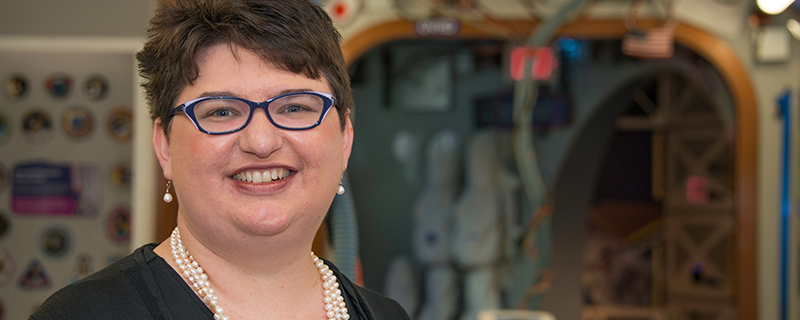Becky Wolfe: Where Fun and Learning Converge

Becky Wolfe always wanted to be a teacher. And with the University of Northern Iowa’s reputation, she says, “Why go anywhere else?”
And so she did, enrolling in elementary education. Through courses in teaching math and inquiry to physical science, she found her niche. “I did field experience in fifth grade, then first grade and then back to fifth grade. I loved it!”
As graduation neared, her family moved from Marion, Iowa, to Kentucky. Wolfe followed them there, completing her student teaching in Louisville. She landed her first job as a fifth grade math and science teacher in Louisville. Now married, she started a master’s program in science education at University of Louisville. She soon discovered the emerging field of informal education.
A different type of education
“We had courses in planetariums, working with kids at the zoo. I thought, I might want to do that someday (when I retire),” Wolfe laughed. Then came a move to Indianapolis where she encountered a tight job market -- and an opening at The Children’s Museum of Indianapolis.
“I had never been to a children’s museum. I was a science teacher, getting my master’s,” she says. But she applied and was hired at the museum, where 89,000 school kids pass through yearly. Twelve years later, Wolfe is now director of school programs and educational resources, developing field trip programs, curriculum and teacher professional development offerings.
“I’m the science education voice on exhibit teams. For example, I worked with NASA on our space exhibit, leading the team to provide that vision, what does it look like," she says. "This takes me back to my foundations. What does the quality of education look like in this space? Lesson plans, assessment – all that holds true in the museum environment as well."
“It’s all interactive. I like walking into the time of dinosaurs, or being put on a space station, or an archeology dig, but also understanding how kids learn. Our challenge is to look at how we can bring the experience into pieces and do that in 20 minutes!” she says.
Learning while preparing
Wolfe oversees an in-depth science lab, and her team develops the curriculum for the museum. Often, that requires research. Less than a year into her job, she was going on a dinosaur dig in South Dakota. She returned six times, and uses such experiential learning to continue to hone the educational experiences at the museum.
The UNI alumna is most proud of the “Beyond Spaceship Earth” exhibit, a re-creation of the International Space Station which opened in 2016. “We helped them unpack their experiences. I learned about engineering and science for that project,” says Wolfe, who has been heavily involved in state and national STEM Education organizations, including a leadership position with the National Science Teachers. The best response to the space exhibit? “Our astronaut advisor declared: ‘I feel like I’m home.’ “
Future projects include an exhibit that will promote dialogue about race, segregation and understanding differences, and another tying science education to health and the issue of childhood obesity. Behind each effort is an appreciation for her alma mater.
A foundation in education
“UNI is absolutely my foundation. It was a quality education and a quality experience rooted in sound educational practices. One course really challenged us to think critically about education, to keep learning, always be learning,” Wolfe says. “I valued the field experiences so much, and I’m now creating so many experiences – experiences which connect back to learning.”
Wolfe has found a home in informal education. “Museums allow for children and families to have free choice in what they learn and see and experience outside of what they do everyday. Museums make you aware of what else is out there, and can be just plain fun. I don’t have my group of classroom students, but I get to go on field trips, to planetariums and zoos, and learn in a completely different setting.
“I hope to continue to expand how we use the museum to address cultural issues and to have dialogue and conversation. I would also love to do more research and codify some of this informal education,” she says. “And I always want to keep learning and tackling new projects and building up educators coming behind me.”
